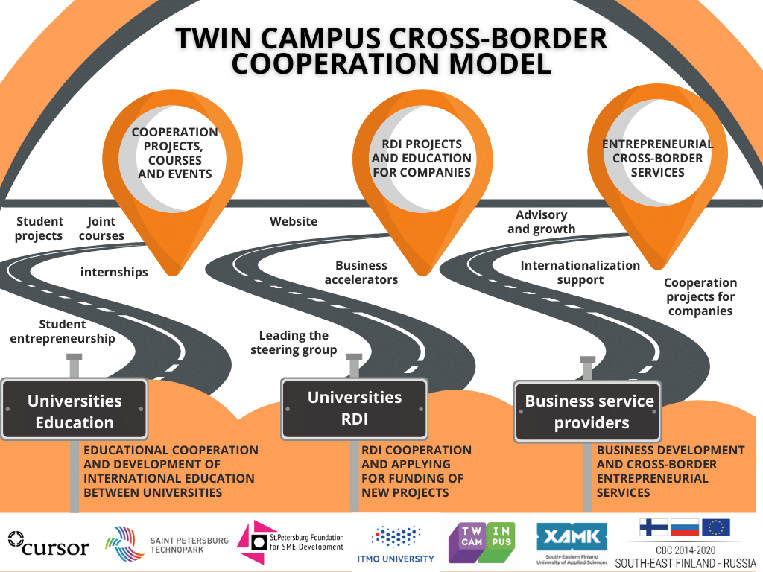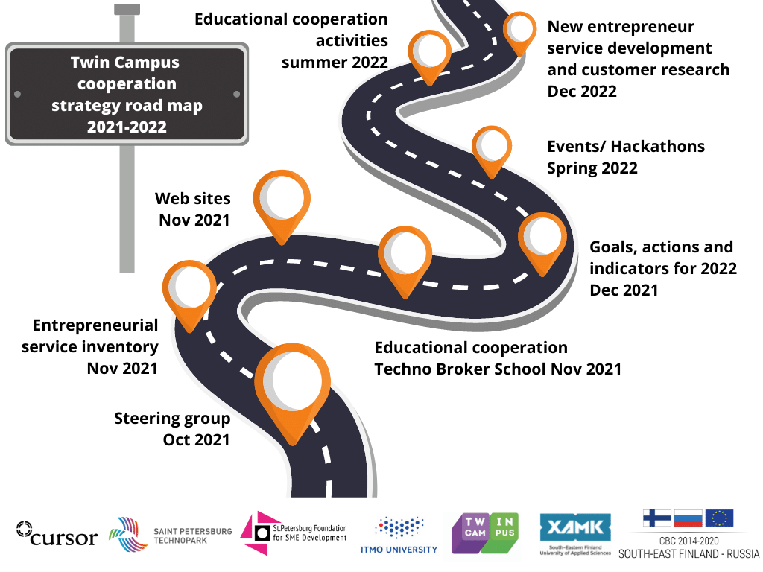The strategy of the Twin Campus Cross-border Cooperation Model
05.10.2021The Twin Campus project focuses on expanding the competitiveness of cooperating regions by creating suitable conditions for developing technology and knowledge-based companies in cooperation with local universities and businesses. Furthermore, the project aims to increase the attraction of the cooperation areas for talent, by creating a strategy and road map for the cross-border cooperation model.
In the Twin Campus project, we have developed the cross-border cooperation between Finnish and Russian partners and created a strategy for future development of the cooperation.
The strategy process started in Autumn 2020. First, we benchmarked good practices in business cooperation, entrepreneurial services, and sustainability in Finnish universities. You can read more about the benchmarking results here. Second, we conducted a survey that mapped the current status, challenges, and goals of the cooperation to obtain more information and better understand the needs of the project partners. Finally, we developed and implemented two co-creation workshops based on the benchmark research and survey results.
The aim of the workshops was to create together the foundation and steps for the strategy of the cross-border cooperation model. Representatives of partners and stakeholders actively participated in the workshops. In the first workshop, we discovered the present and the desired future situation of cross-border cooperation to serve all participants as well as possible. At the end of the first workshop, we had five hypotheses to be tested with the strategy users.
In the second workshop, we examined the hypothesis and continued with the discussions of the functionality of the strategy. From the results of the second workshop, the organizers put together the main themes for the strategy, resulting in the Twin Campus international cooperation model & network and Entrepreneurial services in the Twin Campus context.
Continuous model for development
The cross-border cooperation model consists of collaboration in education, RDI, and entrepreneurship. In this model, cooperation is guided by a steering group of representatives from cooperation partners, and supported by different communication platforms. The cooperation model is designed to give the overall themes of actions without directing the specific activities too much. Each actor is an expert in their work and knows what kind of cooperation is most beneficial. The model engages its users and allows them to develop the strategy actions in the way that they want.


Many iterating rounds have been made with all partners during the strategy process to ensure that the strategy serves all the participants well. In Autumn 2021, Twin Campus project partners have already tested some of the strategy actions. The first tests were the development and implementation of a cooperation event in August 2021. Twin Campus organized an international Doers Startup School together with the *ship Startup Festival. Students at Xamk and ITMO University developed their business ideas for two weeks. The Doers’ top three teams participated in *ship Startup Festivals Pitch Captain pitching competition. Some of the mentors lecture crosswise in both programs. Doers & *ship cooperation was an excellent and successful experiment of educational cooperation.
The continuous operating model for cooperation was one of the main priorities of all Twin Campus project partners. The steering group will start operating in October 2021, and the group’s activities are organised at the practical level of cooperation. The international active cooperation network offers many opportunities for all the strategy users. The common goal, the development of international collaboration, begins with small steps that will turn into giant leaps in the future.
The Twin Campus project is carried out during 01.06.2019 – 30.11.2021, in cooperation with South-Eastern Finland University of Applied Sciences (FI), Kotka-Hamina regional development company Cursor (FI), Business Incubator Ingrian (RU), and St. Petersburg Foundation for SME and ITMO University (RU, project leader) The project is financed by Southeast Finland –Russia CBC 2014 –2020 Programme.
More information:
- https://read.xamk.fi/2021/digitaalinen-talous/yrittajyyden-tukeminen-korkeakouluissa/
- https://read.xamk.fi/2021/digitaalinen-talous/yhteistyo-korkeakoulujen-ja-yritysten-valilla/
- https://read.xamk.fi/2020/digitaalinen-talous/kestava-kehitys-mukana-korkeakoulujen-strategiassa/
- https://read.xamk.fi/2020/luovat-alat/twin-campus-twin-city-twin-stories-and-twice-that-much-opportunities/
































